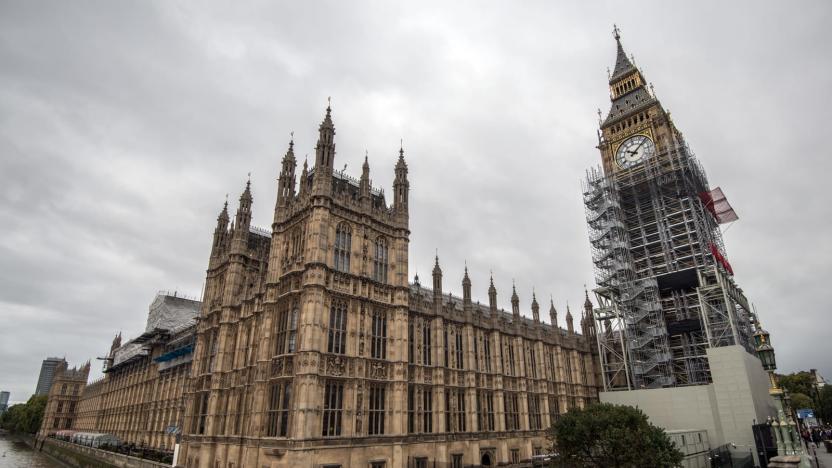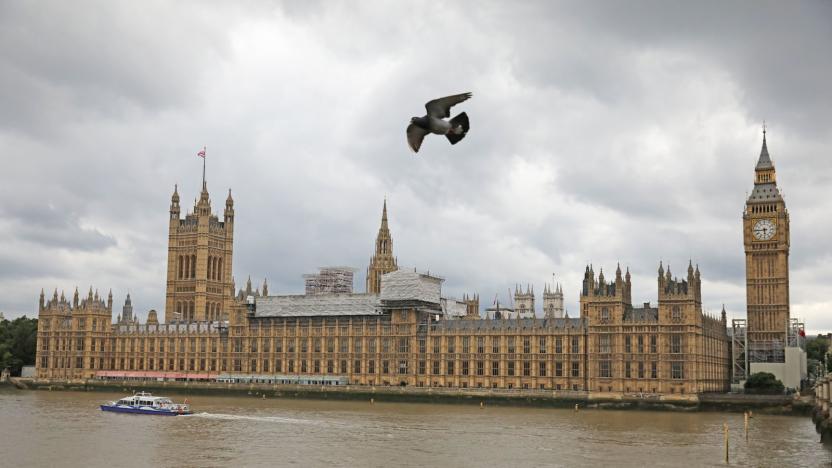parliament
Latest

Facebook reopens investigation to see if Russia influenced Brexit
This past December, Facebook investigated whether Russia had used the social network to influence the EU Referendum vote, or Brexit. At the time, the team found little evidence of UK-related activity from the "Internet Research Agency" in Russia. Now, in a letter from Facebook's UK policy director Simon Milner, the company promises to continue the investigation at the request of Damian Collins, the chair of the Digital Culture, Media and Sport Committee in the House of Commons.

Facebook found essentially no Russian effort to sway Brexit vote
In October, UK officials asked Facebook to look into the possibility that Russian groups had attempted to sway the Brexit referendum through the site. They were particularly interested in whether ads were purchased by Russia-linked accounts and how many times they were viewed if so. Now, the New York Times reports that Facebook has found little evidence of Russian interference, at least when it comes to Russian-purchased Facebook ads.

UK watchdog has to remind MPs not to share their passwords
With the number of computer-based attacks steadily rising in the UK, Britons have been warned over and over again to use strong passwords, to ensure they're not recycled and to never disclose them to a third party. So when three Conservative MPs came out over the weekend admitting to sharing their credentials with interns and other members of staff, it's easy to see why the UK's data watchdog is none too pleased.

Iran blamed for cyberattack on UK parliament
When hackers attacked UK parliament email accounts in June, it was tempting to blame Russia. After all, it's been rather busy lately. However, it looks like people were pointing their fingers in the wrong direction. The Times has learned that British intelligence has pinned the campaign on Iran -- it'd be the country's first cyberattack against the UK, in fact. While the actual damage was relatively limited (about 30 Members of Parliament were compromised out of roughly 9,000 total accounts), the intrusion supports beliefs that Iran has become a serious player in cyberwarfare after years of being little more than a target. Officials aren't commenting on the attack, but there are a few theories as to why Iran would take this risk.

Twitter suspended over 935,000 terror-related accounts since 2015
In a blog post today about its twice yearly Transparency Report, Twitter outlined some numbers regarding its actions against accounts linked to terrorism. Those include accounts that "actively incite or promote violence associated with internationally recognized terrorist organizations, promote internationally recognized terrorist organizations, and accounts attempting to evade prior enforcement."

Hackers target UK parliament email accounts
After a report from The London Times that the email addresses and passwords of British cabinet members and other government officials were being traded by Russian hackers, it looks like the inevitable next step has occurred: a cyberattack on the UK parliament.

Facebook admits its image screening fell short
To say that Facebook has some egg on its face right now would be an understatement. The social network not only didn't take down some sexualized images of children, but reported the BBC when it drew these images to its attention. However, the company now says it has turned a corner. Facebook's Simon Milner tells the UK's Home Affairs Committee that the incident showed the company's moderation system "was not working." The offending photos have since been taken down, he says, adding that the process should be fixed.

UK MPs propose heavy fines for social networks that don't tackle abuse
Although the government is looking to curb the rise of social media abuse by introducing tougher penalties for online trolls, companies like Facebook and Twitter currently don't face much pressure over the policing of their platforms. That could soon change, after Labour MP Anna Turley issued a new proposal calling for communications regulator Ofcom to impose fines up to £2 million for social networks who don't adequately prevent threatening content appearing on their services.

UK MPs launch inquiry into the impact of 'fake news'
What is fake news? That's a question that Facebook has been trying to answer for months, but it's now becoming the subject of a UK parliamentary inquiry. The House of Commons Culture, Media and Sport Committee confirmed today that it will launch an investigation into the "growing phenomenon" of fake news in a bid to define exactly what it is, who is impacted by it and the threat it poses to democracy.

Every UK House of Commons member is getting an iPad
When the UK's Members of Parliament get down to work following the election in May, they'll have more than just a new government on their hands -- they'll have a tablet, too. The Parliamentary tech team is handing out cellular-equipped iPad Air 2 units to all 650 House of Commons MPs so that they have a secure way to do business wherever they are. While 209 of them already had iPads, this move makes them standard issue.

European Parliament passes vote asking for Google to be broken up
Earlier this week, there were reports that the European Parliament would recommend that Google search be split off from other parts of the business. Today, the Parliament has passed a vote the effectively confirms that intention. More specifically, the vote states "The online search market is of particular importance in ensuring competitive conditions within the digital single market", calling on the European Commission "To prevent any abuse in the marketing of interlinked services by operators of search engines". Note, that this doesn't just apply to Google, but potentially any search engine provider. With the motion stressing "the need to prevent online companies from abusing dominant positions" and the recommendation of "unbundling search engines from other commercial services." The European Parliament doesn't have the authority to command member states take action, rather it serves as a strong message to regulators and policy makers that can. Google has declined to comment.

EU wants to separate search from the rest of Google
Google's been caught up in an antitrust tango with the European Union for years, and since the EU hasn't been thrilled with the search giant's attempted concessions, there might be an extreme new option on the table. According to a report from the Financial Times, the European Parliament is expected to ask Google to split itself in twain, leaving its search business separate from the rest of its commercial operations (we've reached out to Google and the European Commission for comment, and will update this story if/when they get back to us). If all goes well (or poorly, if you're a Googler), the matter -- which has the combined support of the European People's Party and the European Socialists & Democrats -- is expected to be put to a vote as soon as next Thursday.

iPad triggers evacuation at Houses of Parliament
If you own an iPad you already know how easily it can kill your productivity, but one of Apple's tablets ruined a work day at England's Parliament when Portcullis House -- an office building that houses government officials and their staffers -- was evacuated over a "suspicious package." Inside that package was the iPad of an apprentice starting his first day at Parliament. According to a recent tweet by Nick Boles, a Member of Parliament, the large police presence spotted outside the office building today was thanks to his apprentice's tablet, though the details of where the iPad was spotted or what suspicious looking packaging it was wrapped in have not been released. The incident comes just hours after Boles tweeted about the need for young people to have opportunities like apprenticeships. If every new apprenticeship starts with a bomb scare, it's probably not a great idea. [via The Independent]

Hungary needs cash, so it wants to tax internet traffic
It's probably a good thing that Google got its Street View surveil of Hungary in when it did, because a new tax being proposed could make internet traffic in the country more expensive. A tax bill draft sent to parliament could impose a 150 forints fee (about $0.62) per each gigabyte transferred. Hungarian politicians are defending this move by saying that because of the way telecommunications have changed, so does how they need to be taxed. Estimates for the proposed income? Somewhere in the neighborhood of 20 billion forints, according to Reuters.

New Zealand Parliament bans software patents with a 117-4 vote
After five years of debate and a 117-4 vote, New Zealand's Parliament has passed a bill that says computer programs are not considered inventions and are therefore ineligible for patents. However, the phrasing of the bill is flexible enough to provide some leeway. Since "products or processes" are understood to be patentable inventions, software that is integral to the implementation of a process designed to improve hardware can be included in the terms of a patent application. The text of the bill, intended to replace the outdated Patents Act of 1953, states, "Protecting software by patenting is inconsistent with the open source model, and its proponents oppose it. A number of submitters argued that there is no 'inventive step' in software development, as 'new' software invariably builds on existing software." You can come to your own conclusions on the matter by checking out the bill at the source link below.

Australians urged to 'lawfully evade' unfair prices on digital goods
After going through a year-long rigmarole of summonses and interrogations to find out why Australians are being overcharged by as much as 66 percent on digitally-distributed Apple, Microsoft and Adobe products, and how the practice of "geo-blocking" prevents customers from seeking fairer prices elsewhere, an Australian parliamentary committee has finally hit on a solution. In the words of committee chairman Nick Champion, speaking to ABC News: "What we want to do is make sure that consumers are aware of the extent to which geo-blocking applies to them and the extent to which they can lawfully evade [it]." Now, if you were hoping that the Australian government would somehow force these companies to drop their prices down to US-equivalent levels, then this quote may admittedly sound a bit weak. It might also seem impractical, since geo-blocking is designed to be difficult to evade, by binding a customer's IP address, credit card or other details to their home market. Then again, things start to make more sense when we factor in the committee's other suggestions. In particular, it proposes that the country's Copyright Act be amended to make it clear that an Australian won't be prosecuted just because they annoyed a multinational tech company by circumventing its geographic restrictions -- and, indeed, the population as a whole should be taught "tools and techniques" to achieve this wherever possible. The committee even recommends that Australians should have a "right of resale," such that they could legally remove locks on digital content that limits it to one user or one ecosystem. We have no idea how seriously the government will take these ideas, or how quickly it may implement them, but the committee's defiant tone makes for some good reading at the source link.

UK government receptive to bill that would pardon Alan Turing
Many in the UK recognize Alan Turing's contributions to computing as we know it, but attempts to obtain a pardon for the conviction that tragically cut short his career have thus far been unsuccessful. There's a new glimmer of hope, however: government whip Lord Ahmad of Wimbledon says that the current leadership has "great sympathy" for a bill that would pardon Turing. As long as no one calls for amendments, the legislation should clear Parliament's House of Lords by late October and reach the House of Commons soon afterward. While there's no guarantee that the measure will ultimately pass, the rare level of endorsement suggests that Turing's name could soon be cleared.

UK surveillance agency off the hook, legally, for PRISM
It may be the US government generating the most PRISM-related headlines, but the UK authorities have found themselves in plenty of hot water as well. If you were one of her privacy-concerned citizens hoping to see someone at the Government Communications Headquarter (GCHQ) get their comeuppance, then you're going to be sorely disappointed. The Intelligence and Security Committee (ISC) of Parliament has found that the GCHQ was within its legal powers to collect data on citizens. In particular, the committee cited the Intelligence Services Act of 1994 as giving the authority to do so to the GCHQ. This is far from the end of this saga, but for Brits hoping there would be quick legal retribution for those who unceremoniously listened in on your personal communications, it's a sad day indeed.

Adobe preemptively cuts prices to avoid wrath of Australian lawmakers
Adobe has suddenly knocked 20 percent off its prices in Australia just one day after it was summoned to publicly defend those prices in front of a parliamentary committee. The monthly fee for a subscription to Adobe's full Creative Cloud has dropped from AU$63 to AU$50, so it's now only $1 more than the US price when you factor in currency. The no-contract monthly cost has also fallen to match how much Americans pay -- from AU$95 to AU$75 -- which is exactly what Australian lawmakers have been demanding since 2011. We can't decide if this is a move of brilliant cunning on Adobe's part, or just a blatant effort to side-step blame for how much it's been charging up to this point. Either way, it puts Microsoft and Apple in a sticky situation, because they've been summoned to the same inquiry and may be left with fewer excuses to cling to.

Apple, Microsoft asked to explain pricing to Australian government
Apple and Microsoft are among a few tech companies going before the Australian Parliament this week, asked to explain what many are seeing as price gouging in the Australian market. Here in the US, for example, Apple's Mac OS X Server 10.6 sells for $499, but in Australia, the same software sells for $699. Similarly, iTunes albums that sell for $9.99 in the US often sell for more than $20 overseas, despite the Australian and US dollar being less than a few cents different. In the past, electronics companies have claimed that Australia is a smaller market to deal with, and that setting up support structures and other delivery systems there raise costs. But Parliamentary representatives are saying those excuses aren't good enough, and are inviting Apple, Microsoft, and others to represent themselves in Australia this week. [via TechCrunch]











